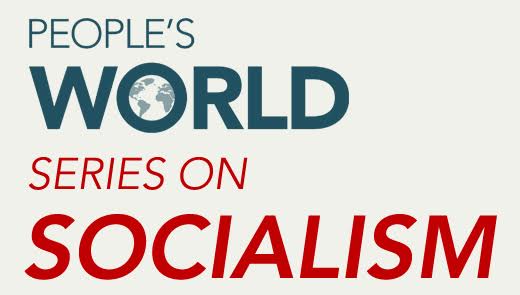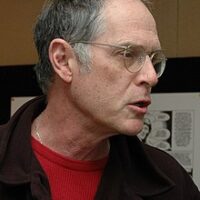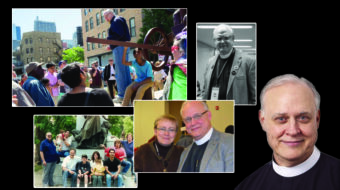
People’s World Series on Socialism
Everyone seems to be talking about socialism these days, but what does it mean? That was the question asked by Susan Webb in one of our most popular and widely-shared recent articles. Millions of Americans are considering alternatives to a system run by and for the 1 percent. They are taking an interest in socialism, a word that has meant a great many things to activists, trade unionists, politicians, and clergy around the world over the last century and a half. The article below is one of a series on socialism, what it can mean for Americans in the 21st century, and how we might get there. Other articles in the series can be found here.
I am a U.S. historian as well as a half-century activist, interviewer of old-timers in the 1970s, 80s, and 90s, and a reader of the historic left-wing press in English, German, Yiddish and (a little) Italian. This is the background that shapes my framework for reasoning on the subject of socialism.
Before 1920, many in the radical movements saw socialism as an inevitability. The growth of the industrial working class, of socialist education and self-education, and the extension of the right to vote to ever-wider groups of people appeared to be carrying society along toward a socialist future.
The followers of the Industrial Workers of the World (IWW) envisioned a different path. They advocated the outright abolition of the existing state in favor of a decentralized, functional self-government of workers.
One belief they all shared, though, was that the workers of different countries would stand together and refuse to kill each other in the event of any war. International solidarity would cripple any military conflict. The grim reality of 1914-18, however, brought sweeping disillusion. It was a despair from which, in some ways, the Left, as a once-optimistic, popular movement of socialists in the U.S., has never recovered.
Bolstered by the Bolshevik Revolution in Russia, one segment of activists at that time (mostly the younger ones) nevertheless came to see a global movement of nationalities and races, very much present in blue collar America, as part of the vast working class struggle. They concluded that a vanguard party would be necessary to lead the world movement to a socialist future.
The “party of a new type,” Lenin’s notion considerably modified, saw fruition in the United States in the form of the Popular Front with the Communist Party USA at the center, from the middle 1930s onward. Contrary to the claims of most existing histories, this development was an organic one, not simply an artificial imposition from abroad. It was organized from the bottom up, as well as signaled from Moscow.
In the process, “revolution,” i.e, socialism, was once more re-conceived, this time as a series of steps through and beyond something like the New Deal. Perhaps a million followers in unions, summer camps, cultural, and fraternal associations shared this vision. It shaped the lives and hopes of ethnic and racial minorities in far-flung communities and was reinforced by victories for unionism and the struggle against fascism. This version lasted, with some gaps, until around 1946.
It was smashed (also amidst considerable disillusionment) during the following ten years of reaction. Thousands of its veteran activists though, the vast majority no longer in any Left organization, went on to lead a range of community struggles. And just as importantly, they bestowed upon the future Left their children.
New Leftists (my own generation) came of age in a different time, when unions at large fell under rigid, conservative Cold War leadership. The Cuban Revolution and the civil rights movement, however, opened our eyes to a changing world. Personal freedoms were advancing, for the young in particular.
The Vietnam War transformed us by precipitating a vast protest movement that stretched from the campus out into the wider community. We learned to organize, publish our own local (“underground”) press, and reach out to build alliances. “Liberation” came to be viewed as a cultural and political movement, with momentum around the planet. Everywhere, it emphasized youth.
With its collaborating movements – civil rights and Black liberation, gay liberation, women’s liberation, and others – it helped shape both a phase of popular culture and new ways of seeing the world.
Like the Old Left, however, our movements were infiltrated and disrupted. Energies dissipated in despair at the recuperation of capitalism. The New Left disintegrated and finally seemed, as a mass force, to disappear, if never entirely. We, like our predecessors, carried on, struggle after struggle and managed to prompt another generation or two beyond ourselves.
In time, the Popular Front model – work within the Democratic Party as well as outside – returned in new forms. Socialism as a vanguard party, as a movement centered in Russia, however, was now gone.
Socialism though, as a vision of a world freed of ecological catastrophe, remains alive and mandatory. Waves of popular struggle – Occupy, Black Lives Matter, the Bernie Sanders campaign – continue to rise. They always will.
Our role, as my now elderly generation concludes, is to find ways to make ourselves useful to these movements and to find the road back to socialist visions for ourselves and younger generations. How different this experience is for American socialists, despite all the changes of a century, offers intriguing questions.
Paul Buhle, founder of the new left journal Radical America, has published widely on the history of the Left in the U.S. and the Caribbean. In the last decade, he has turned to creating radical, nonfiction comic art books. Some of his recent titles can be found here.












Comments